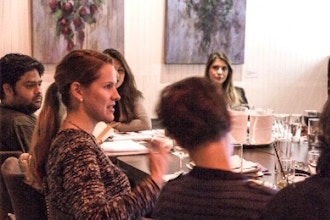Infinity: History, Mathematics, Philosophy
- All levels
- 21 and older
- $315
- 247 West 37th St, New York, NY
- 12 hours over 4 sessions
Thankfully we have 2 other History Classes for you to choose from. Check our top choices below or see all classes for more options.
Brooklyn Institute for Social Research @ Online Classroom
Embark on a captivating exploration of Mesopotamian civilization through archaeology and material culture. Join us at the Brooklyn Institute for Social Research as we delve into the origins, structures, and legacy of this ancient society, unraveling its significance amidst historical interpretations and contemporary geopolitical contexts. Uncover the complexities of Mesopotamia's urbanization, social structures, and technological advancements, and discover how its material remains offer insights into our understanding of the past and present.
May 8th
6:30–9:30pm EDT
Meets 4 Times
Brooklyn Institute for Social Research @ Online Classroom
Uncover the entwined history of psychoanalysis and state power in a captivating exploration of repression tactics. Join us at the Brooklyn Institute for Social Research as we delve into the intersections of Freudian theory with military strategy, urban policing, and guerrilla warfare. Through an array of diverse readings, we'll analyze how psychoanalytic concepts have been utilized to pathologize dissent and justify both state and revolutionary violence, raising critical questions about power, resistance, and the psyche.
May 12th
2–5pm EDT
Meets 4 Times
How can we, as finite beings, grasp the concept of infinity? Yet humans have been contemplating infinity for millennia, whether inspired by nature, philosophy, spirituality—or mathematics. This course is a historical and conceptual approach to the latter realm, the mathematics of infinity. Our topics will include the ancient Greeks’ discovery of irrational numbers and Zeno’s paradoxes; Aristotle’s distinction between “actual infinity” and “potential infinity”; debates about infinitesimal numbers in the history of calculus; and the seeming paradoxes of infinite sums.
But our main goal will be explore the beauty of “the paradise that Cantor created for us”—the theory of infinite sets created by Georg Cantor in the 1880s. We will grapple with one of the great proofs in the history of mathematics, Cantor’s famous “diagonalization” argument, which shows that the set of real numbers is uncountably infinite–meaning, in a precise sense, that the real numbers constitute a larger infinity than the integers (the “counting numbers”). In fact, Cantor’s argument establishes that there is an infinite hierarchy of infinities!
As a guide to this intellectual history, we will read portions of David Foster Wallace’s Everything and More: A Compact History of Infinity and William Dunham’s Journey Through Genius: The Great Theorems of Mathematics in conjunction with additional readings on the history, mathematics and philosophy of infinity, including primary texts by Cantor, David Hilbert and Kurt Gödel.
Note:
There *is* no physical Brooklyn Institute. We hold our classes all over (thus far) Brooklyn and Manhattan, in alternative spaces ranging from the back rooms of bars to bookstores to spaces in cultural centers, including the Center for Jewish History, the Goethe-Institut, and the Barnard Center for Research on Women. We can (and do) turn any space into a classroom. You will be notified of the exact location when you register for a class.
This course is available for "remote" learning and will be available to anyone with access to an internet device with a microphone (this includes most models of computers, tablets). Classes will take place with a "Live" instructor at the date/times listed below.
Upon registration, the instructor will send along additional information about how to log-on and participate in the class.
In any event where a customer wants to cancel their enrollment and is eligible for a full refund, a 5% processing fee will be deducted from the refund amount.

People who viewed this class also viewed the following classes
Get quick answers from CourseHorse and past students.
The Brooklyn Institute for Social Research was established in 2011 in Boerum Hill, Brooklyn. Its mission is to extend liberal arts education and research far beyond the borders of the traditional university, supporting community education needs and opening up new possibilities for scholarship in the...
Read more about Brooklyn Institute for Social Research

This school has been carefully vetted by CourseHorse and is a verified Online educator.

Booking this class for a group? Find great private group events



More in Life Skills




Get special date and rate options for your group. Submit the form below and we'll get back to you within 2 business hours with pricing and availability.